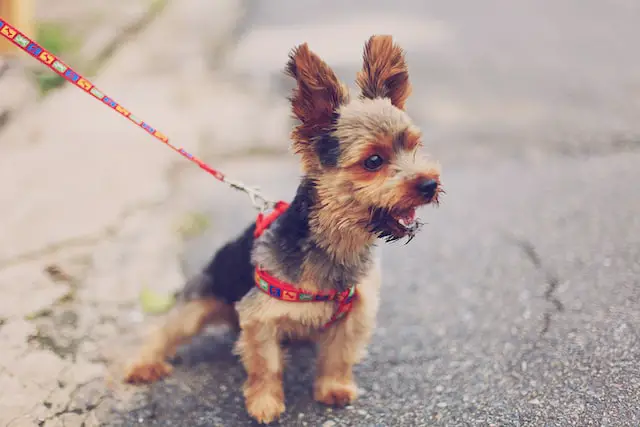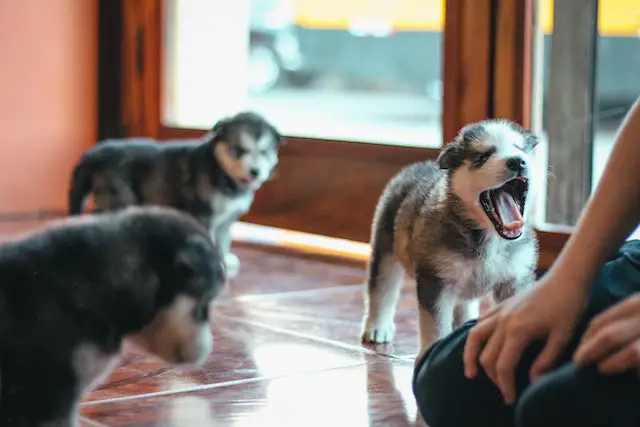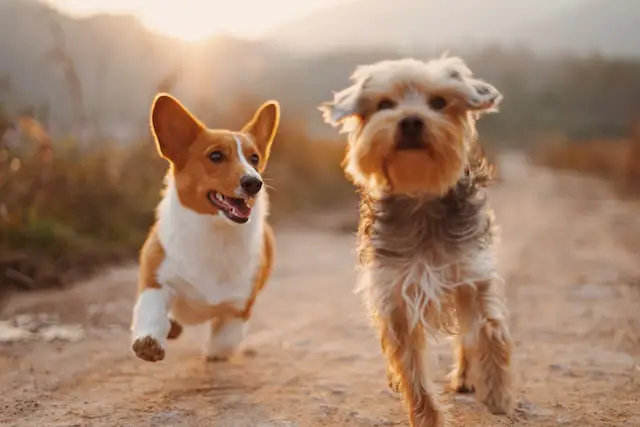You’ve got a new puppy who thinks it’s nice, but now it creates trouble by barking too much? This is common to inexperienced dog owners. Your house isn’t strange for you, but it may be hard to digest relocation for a new puppy. According to experts, most puppies bark ridiculously because they are afraid of being alone. Puppies or dogs may be attacked by anxiety, and they bark and continue to bark.
You leave the room and start to bark instantly. Think about a few hours leaving the house? It was with his mother and other puppies before you brought the puppy to your home. They were very safe in their minds or simply familiar and comfortable. Are you still angry at your barking little puppy?
So many people stroke their puppies or dogs and silence them, but do you do them justice? If you continue, you will probably have a spoiled dog shortly. You can’t even bark and bark it, however. After all, you don’t want your family and friends to get upset. Using the dog training methods mentioned below, you can win over this situation. Test these steps and tackle this barking problem:
1.) Try to ignore barking as much as possible instead of screaming at the puppy. Your cry will never solve the problem. By screaming, you make the puppy more anxious, or you will only frighten the puppy, and the puppy will stop coming out of love.
2.) You know now that your dog or puppy barks for fear of being alone. Try to avoid any situation where you have to go for a long time. Your departure will, even more, frighten the puppy. A golden rule here is not to spend time with your puppy and talk sweetly before you go because when you go away, your puppy will begin to miss you and cause fear. The same should be followed when you come home. Just don’t let your dog wait for you because your dog will be depressed at the late house.
3.) Water gun is an excellent way to stop barking your dog. The water gun is widely used in dog workouts as it does not harm the puppy/dog. Whenever the dog begins to bark, spray a little water on his face and stop right there. Don’t spray more water because we don’t want our dog’s nose to flood.
In short, when training a dog, you should never forget that the reason behind your puppy barking is the feeling that you are all alone. Don’t be harsh about them. Don’t be difficult. Give it a while, and you will soon have a loving, quiet, and peaceful pet.

Top tips on stopping dog barking
There are many ways to force a growing dog to stop barking – vibrating collars, collars, and many others. You nevertheless wondered why some dogs bark and others don’t?
One of the answers is that barking depends on your dog’s race. Some dogs were selected as watching dogs because of certain features, which made them reliable. Others have been chosen because of their aggression, ability to work, or cuteness as a shepherd. The reasons are many, but you won’t need any features if you live in an apartment in a big city.
A second part of the response is that your dog has learned to bark. He was rewarded every time he did it as a puppy. You could say you never awarded your puppy for barking, but it’s not true. Every time your puppy barked, and you paid attention to him for whatever little reason, you taught him to bark every time.
The best thing you can do is teach a puppy not to bark if it is not required. I mean by training your puppy to be rewarded for not barking. If it starts to bark in cars, sheets, or any minor distractions, it would mostly do the trick to ignore your puppy.
Some puppies, however, won’t get the message and bark every time. Puppies must be rewarded for not barking in this case. A reward can be a small dog cookie or rubbing behind your ears. Any good reaction is going to do the trick.
In every situation that causes you to bark, you should train your puppy. Alone at home, near cars, near children, visitors, and in any other case you may consider necessary.
Don’t force your puppy into the situation at the beginning. Just face it for a few minutes and reward it if it doesn’t bark. It will undoubtedly receive the message, as most puppies would like their master to please.
In rare cases, puppies will not react to this kind of training. This is mainly because they are distracted from the training. If you try it several times, you will mostly overcome your pet’s initial inertia.
how to stop puppy from barking at other dogs
If your dog is older and already has an established barking process, it will be a little more complicated but not impossible.
1. Watch your dog.
Watch her as your dog barks to see how she acts. Does she bark at the door out of the window? Does she bark frighteningly or calmly? How’s it sounding? Is it fast, tall, low-pitched? Are groanings mixed in? Is she stopping on her own?
What you’re looking for is an indication of how she always acts. Sometimes, she barks at visitors, sometimes only to get your attention for a different reason. Toy out of reach, eager for dinner, threatening a household member (including other pets). What you watch will determine how you react.
2. Be careful about natural barking breaks.
Dogs usually bark in ‘paragraphs.’ Some may do a 5-6 bark series, take a break and make another 5-6 bark series. Other dogs are going to bark a lot longer. These natural breaks give you the perfect picture of when you get the best results to stop her.
What she does is bark, listen, and bark again. You can rest assured that dogs don’t just bark. They’re listening. If the problem still exists, they will bark again.
3. Check out your dog’s barking cause
One thing the dog wants is to do something for you. “Come and see what is going on so that we can jointly fear the threat.” She’s looking for your support, in other words. Go to her side, look where she barks. Where she barks, note what the barking could be.
4. Stop the barking
Instruct your dog quietly to “stop!” or “quiet!” If you shout, your dog will think that you bark too, which indicates that it’s okay that she keeps barking. The best time to coordinate your workout is between natural rest stops. Wait till she gets to one and tell her to be still.
5. Shorten the time allowed to bark
You probably won’t ever bark at your dog. This would also be somewhat cruel because dogs bark as we speak. What you want is to shorten the barking time of your dog. The first thing you have to do is teach her to stop barking, as explained above. Then work for a shorter time to stop her. If you want to bark your dog for one or two five barks each, allow it and tell it to stop.
This process works well. It would help if you let the dog know that you have heard the warning, show support by looking at the possible cause, and then instructing her to stop in a still, quiet voice.

Stopping Puppy Barking
A new little puppy in the house can be a lot of fun, except when they won’t stop barking incessantly, which is something that yippy yappy puppies seem to enjoy doing, especially during the night, it seems. Intense barking is highly irritating, and if you allow your puppy to continue in this manner, he will constantly bark and not understand when it is appropriate to bark and when it is not. Some techniques are proven to be effective in stopping puppy barking, and they are also quick.
Dogs bark for a variety of reasons, including:
In this case, the dog is alerting his owner to the possibility of a stranger approaching the house or door, which is appropriate barking.
- When dogs are bored, they may bark continuously for some time.
It is understood by the dog that he will receive attention as a result of his barking, albeit negative attention.
- Barks at other dogs or animals in the vicinity.
The first thing to try is to introduce commands, and when he starts barking excessively, stand in front of him and command him to “Stop.” If he obeys your command and stops barking, rewards him with a small doggie treat. Just be firm in your voice commands, rather than yelling the word “Stop.”
This method can be used to stop puppy barking, but try to save it for last as a last resort. When your puppy is barking excessively, you can use a squirt water bottle to spray him in the face, which will stop the barking. When he barks non-stop, it doesn’t hurt him, but it does teach him that if he continues to bark, something cold and wet will be sprayed directly in his face, which he does not appreciate. As you pour a small amount of water, say, “Stop.”
Regular physical activity for your dog will usually help reduce the amount of barking he regularly does. When puppies are young, they require additional attention, so make an effort to spend extra time with them while adjusting to their new home. Puppies need stimulation to keep them from becoming bored, which can result in unwanted barking. Perhaps you should get into the habit of taking your dog for a long daily walk; it will be beneficial to both of you, and the barking will subside because the puppy received attention from you and was not bored, and he will be tuckered out from the walk. He will be too tired to bark as a result.









